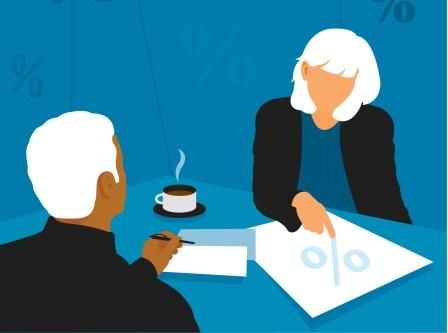
There are instances where most banks offer people who are struggling financially the chance to temporarily press pause on their loans, whatever the debt may be used for.
A case in point being the current crisis where millions have lost their jobs or have had a major salary cut, making it nearly impossible for them to make up their monthly due payments.
This is when a deferment period is an agreed-upon time during which a borrower does not have to pay the lender interest or principal on a loan.
However, depending on the loan, interest may accrue during a deferment period, which means the interest is added to the amount due at the end of the deferment period.
The principal balance of a loan increases when payments are postponed during periods of deferment or forbearance and unpaid interest is capitalized.
However, there are instances where interest does not accrue during deferment periods. For example, subsidized student federal or government loans in the US.
Also, interest doesn’t accrue in the deferment offers from UAE banks to COVID impacted customers.

UAE banks availed loan waivers during COVID-19
In the UAE, as a result of the rare COVID-19 pandemic, all loan and credit card customers were permitted to make a request to postpone payments by one to up to six months with interest deferred, varying with each customer and as per the loan availed.
(Each bank has its own policy and the decision on how much can be waived is left to discretion by each lender. The more dire the need, bigger the priory the applications gets over others.)
Business owners in the UAE, that are proven to be medically affected by the COVID19 virus outbreak, were in some cases offered an option for their loan installments to be deferred and interest waived for a period of up to 6 months.
Individuals with personal loans, car loans, mortgage loans and smart loans/finance were given the option of one-month deferment and in some cases even more – depending on a case-by-case basis.
Also, for customers holding a loan product who are placed on unpaid leave by their employers or their income is affected by the COVID19 virus outbreak, a payment deferral of up to 3 months were offered by a lot of banks.
Customers holding a loan product and placed on unpaid leave by their employers, a payment deferral of up to 3 months were offered by a lot of banks.

Interest accrues in most other loan deferrals
Interest does although accrue on unsubsidized loans (for example student loans that are not based on financial need, especially in the US).
At times when lenders avail such a waiver on borrower obligations, there are many who defer loans even when they are able to currently make ends meet
At times when the government or lenders avail such a waiver on borrower obligations, there are many who defer their loans even when they are able to currently make ends meet,
This is done with the intention that they can utilize this chance to get a temporary relief on to their monthly debt payments. But this isn’t as great an idea as one might think. Here is why
Does interest accumulate in your case?
When a borrower defers a loan — or temporarily suspends repayment because of unemployment, financial hardship or any another reason — interest still accrues in most cases.
This is what most do not take into account and why many are quick to availing loan deferment options.
So, before we go any further understand that this is only a grace period, not a waiver of the loan.
Let’s say you have a Dh350,000 mortgage and normally pay Dh729 in interest each month. This amount will still be added to your loan each month it’s paused, which is called capitalizing the interest on your loan.

So, if you do not pay the next two monthly installments (EMIs) of your loan, you may not be blacklisted, but the bank will charge interest for the unpaid amount.
Missing two installments could extend your loan by 6-10 months or increase EMI amount by about 1.5 per cent.
However, in a typical real world EMI scenario, a deferment should extend the loan only by the number of installments deferred. EMIs are inclusive of interest and principal components.
So, a few deferrals won’t involve interest capitalization and reformatting of payment schedule.
Or, your minimum repayment after the repayment pause will be higher you pay more interest in the long term if you do take a repayment holiday. So only do this if it’s absolutely necessary.

Longer the tenure, bigger the impact
The longer the remaining tenure, the bigger is the impact. This is because the interest accounts for a larger portion of the EMI in the early years and progressively comes down.
It is however important to note that after the first year, the interest accounts for almost 80 per cent of the EMI.
Interest accounts for a larger portion of the EMI in the early years and progressively comes down.
But towards the end of your long-term loan, let’s say in the 20th year, the interest portion is less than 10 per cent in the EMI.
So, people with loans taken say 10-15 years ago will not feel the burden as much as someone with a new loan taken just a few years back.
What this implies is that people with older loans may not really need the moratorium as much as those with younger loans. Again, go for the deferment plan only if there is a dire need.
Now, if you were wondering why interest is still accrued and not cancelled, you should remember that as banks operate like any other business, completely forgoing all loan repayments is unsustainable.

Bank support only for a limited time
By doing a pause, lenders provide assistance during an unprecedented difficult period – and you can chip away extra repayments once things are back to normal and you're in a better financial position to do so.
However, asking for a break in mortgage or vehicle payments could be the best path to follow if it means the difference between keeping your property/car and having to sell when it doesn’t suit you.
Asking for a break in mortgage or vehicle payments could be the best path if it means the only other option left is to default.
Some may wonder whether any such pause in repayments will affect a person’s credit rating. The answer is deferring your student loans won't affect your credit directly at all.
A deferment will be listed in your credit report, but it's not a negative or a positive thing when it comes to your credit score.
Most banks do not report repayment pauses as a missed payment on your loan, so this repayment holiday won’t affect your credit rating. But this may not apply to all cases.
Some cases of prolonged loan deferrals can increase the age and the size of unpaid debt, which can hurt a credit score.
If a cardholder doesn’t pay for two months, the cumulative interest could add up to more than 7 per cent in a lot of instances.
The additional expenses charged to the card over the next two months will also attract interest. What’s even worse is that, you will be charged interest on the interest not paid in the previous month.
However, what one could do is if you don’t have enough liquidity and have a massive credit card bill is get the amount converted into easy monthly installments, an option that most card companies offer.

Card companies are willing to turn the outstanding amount into easy EMIs of up to two years.
The firms will still go ahead and charge maybe 15-20 per cent on this, but that will still be lower than the 35-45 per cent annualized cost of rolling over the credit card balance.
Card companies are willing to turn the outstanding amount into easy EMIs of up to two years.
You can also avail of a personal loan to settle the outstanding credit card bill. At 15-20 per cent, personal loans are not cheap but not as costly as rolling over the credit card bill.
How repayment holidays work
In the current pandemic crisis, if you have been tested positive you may get a waiver for even six months. Some will also waive late payment fees.
After the waiver period some lenders take a review. They will then determine if a further holiday is the right thing to do, but this differs from lender to lender.

It’s also important to understand that each bank’s pause mechanics vary, as does the eligibility criteria.
It’s also important to understand that each bank’s pause mechanics vary, as does the eligibility criteria.
In case of having to defer home loans, some banks restrict assistance to owner-occupiers while others also have provisions for investment property loans.
• Let’s say interest accrues in April and May, then the borrower can make a one-time payment in June
• The interest is added to the outstanding loan which will increase the EMI for the remaining months
• The EMI is kept unchanged but the loan tenure is extended. The number of additional EMIs will then depend on the age of the loan

Pressing pause is also not the only option if you’re struggling to pay your loans.
You could also reduce your payments for a period to help you through tough times rather than pausing the full loan repayment. Stopping or reducing your payments may help you avoid default.
You could sometimes also access funds in your redraw facility if you’re ahead on your payments. Switching to interest-only payments for a period of time to reduce financial stress could also be an option, advisors recommend.
You could also reduce your payments for a period to help you through tough times rather than pausing the full loan repayment.
What to do if you’re facing financial hardship?
Even when a country in general isn’t reeling amid a severe economic crisis, most banks handle numerous customer financial hardship queries, which they handle on a case by case basis.
Generally it takes a more than a week or two to process your request, so reach out to your lender as soon as possible.
What financial planners often recommend is avoid making such queries if your situation hasn’t changed.

What financial planners often recommend is avoid making such queries if your situation hasn’t changed. With banks doing all they can to help people with genuine needs, if you don’t need help, leave your lender’s resources free for people who genuinely need them.
It’s also important to understand you won’t automatically be offered the chance to press pause on your loan. Offering a pause is at the lender’s discretion. Banks are businesses and they need weigh up the risk of offering a pause to customers who are not in a position to sustain a loan long term.
It’s also important to understand you won’t automatically be offered the chance to press pause on your loan.
You will get short-term relief if your bank approves you to pause your loan. But if your situation doesn’t change, you do need to have a financial plan beyond six months.
This is because there’s currently no talk of extending this period of leniency beyond that time.
Make sure to keep your bank fully informed of your financial position if you are struggling with your repayments and ask about any assistance that’s available.








